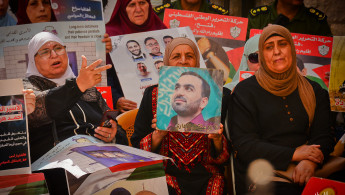Hamas says it will support Palestinian prisoners ahead of mass hunger strike
Hamas has warned Israel of consequences if it continues to mistreat Palestinian prisoners in Israeli jails amid an ongoing campaign of civil disobedience by detainees which has lasted nearly a month.
"Hamas will not allow the Israeli occupation a free hand to deal with [Palestinian] prisoners," said Saleh Arouri, the deputy leader of the Palestinian Islamist movement which rules the Gaza Strip on Tuesday.
"Any attack on the life of prisoners will be met with a response," said Arouri from Turkey, adding that "liberating our prisoners is a top priority for Hamas".
Arouri's remarks came as Palestinian prisoners continued their disobedience campaign inside Israeli jails for a 29th day, protesting repressive measures introduced by extreme-right Israeli National Security Minister Itamar Ben Gvir in early February.
These include restricting water quantities and shower times for Palestinian prisoners to four minutes, restricting bread-making in jail bakeries and family visit times to half-an-hour per month, and increasing solitary confinement and the transfer of detainees between Israeli prisons.
The Palestinian prisoners in Israeli jails entered day 28 of their disobedience steps, which they staged in protest at the arbitrary punitive measures that were taken against them recently at the behest of far-right security minister Itamar Ben Gvir. pic.twitter.com/L4299BDL11
— AlQastal News (@QastalNewsEn) March 13, 2023
The Palestinian prisoners' disobedience campaign includes refusing to step out of cells for morning counting, refusing to leave their cells for courtyard time, noise disturbance at night and rejecting certain meals.
The High Emergency Committee, the Palestinian prisoners’ united leadership body, announced in early February a mass hunger strike to start on 23 March, the first day of the Muslim holy month of Ramadan.
On Friday, representatives of three Palestinian factions -Hamas, the Palestinian Islamic Jihad (PIJ) and the Popular Front for the Liberation of Palestine (PFLP) - said at a press conference in front of the International Red Cross offices in Gaza that negotiations between prisoners' representatives and the Israeli prison services had failed to reach any agreement.
"The prisoners continue their disobedience actions that include more prisons than at the beginning of February," Ayah Shreiteh, a spokesperson for the Palestinian Prisoners' Club, told The New Arab on Tuesday.
"The occupation prison services had placed dozens of prisoners in solitary confinement as response to the disobedience, especially in the Negev prison, but they all ended their isolation and returned to the collective rooms with other prisoners," said Shreiteh.
"However, the prison services haven't given any ground to the prisoners' demands, and the tensions are still high, which is why the hunger strike will most probably take place, as there is no sign of a solution ahead," she added.
"The hunger strike will certainly mobilise the Palestinian street, as hundreds of prisoners are expected to take part in the first wave of strike, and things might evolve to larger escalation, depending on how long the strike lasts."
You reveal the truth too late, so where were you before and why didn't you speak up?
— انا.......حُـــــــر 🇩🇪🇲🇦🇱🇧🇩🇿🇮🇶🇵🇸 (@Kojack50) March 14, 2023
Former Zionist soldiers reveal their brutal treatment of civilians and Palestinian prisoners pic.twitter.com/vG8aLxRZc5
On Tuesday, a coalition of Palestinian civil organisations supporting Palestinian prisoners announced protests and marches in the centres of all major West Bank cities on Wednesday evening.
Earlier in March, hundreds of Palestinians demonstrated in Ramallah, Bethlehem, Jenin and Hebron in support of the prisoners. The head of the Palestinian High Commission for Prisoners’ Affairs, Ameen Shouman, told TNA at the time that "a programme of protests has been agreed between Palestinian factions and civil society groupss that will escalate up to the day of the start of the hunger strike".
The Israeli Knesset is expected to vote in a first reading of a bill presented by Ben-Gvir's extreme-right Otzma Yehudit ("Jewish Power"), allowing the death penalty for Palestinian prisoners. The bill was approved into the legislation process in a preliminary vote by a majority of 55 to 9.
"We have discussed the implications of this bill with members of diplomatic missions to Israel, and briefed them on the situation of Palestinian prisoners inside the occupation jails," Milena Ansari, spokesperson for the Palestinian human rights group Addameer, told TNA on Tuesday.
"Diplomats showed a great understanding of the gravity of the situation inside the occupation jails and of the implications of the death penalty bill. It was clear though that they wouldn't take any public position before the hunger strike."
Currently, Israel holds some 4780 Palestinians in its jails, including 29 women and 160 children according to human rights groups. Hundreds are held in administrative detention without charge or trial.
On Tuesday, Hamas also warned Israel that it would retaliate against any provocations at Al-Aqsa Mosque during the holy month of Ramadan.





 Follow the Middle East's top stories in English at The New Arab on Google News
Follow the Middle East's top stories in English at The New Arab on Google News


